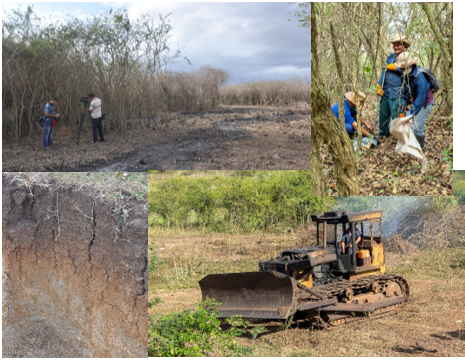Eco-friendly multidisciplinary approaches for controlling and harnessing Marabú (Dichrostachys cinerea) in central eastern Cuba
VLIR TEAM project 2017-2022
Partners: SoFer, UGent (coordinator), Agronomy department University of Camagüey Ignacio Agramonte Loynaz (UCIAL), Agronomy department University of Las Tunas (ULT)
Sicklebush or Dichrostachys cinerea (known as ‘Marabú’ in Cuban) is an exotic invasive species imported in Cuba in the 19th century as ornamental shrub that has expanded dramatically over Cuban agricultural land during the past 2-3 decades. It is a leguminous shrub that typically forms impenetrable thickets, completely outcompeting other vegetation, and rendering reclamation of invaded land extremely challenging. In this project we hypothesize that a containment of very aggressive invasive woody species such as Marabú at a reasonable predefined and tolerated level of infestation is possible through appropriate strategic management practices coupled to value-chains generating incentives. Our hypotheses are as follows (‘opportunities’):
- invasive woody plants can contribute to conserve or restore soil health, particularly at highly disturbed sites and under conditions of climatic changes
- invasive woody plants can, under proper management, be integrated and thereby contained in economical-ly sustainable and environmentally stable agricultural/forestry/silvopastoral systems at predefined tolerated levels of infestation
- this will generate new value-chain options for small-scale private (cooperative) enterprises, and thereby incentives for activities contributing to improved containment and control
This project is a collaboration between the Following main results are envisaged:
- creation of an interdisciplinary group with strengthened research capacities on Marabú control at UCIAL and ULT
- quantification of potential uses and benefits of Marabú (i. soil fertility improvement, disease suppressiveness; ii. carbon sequestration by addition of Marabú derived biochar; iii. Marabú leaves and pods as suitable protein source in dairy cattle diets)
- development of eco-friendly Marabú containment strategies.
- implementation of containment strategies in the areas selected by the project
(clockwise from top left): Marabú infestation on private farm; soil sampling in Marabú infested land; soil profile after > 20 years Marabú infestation; bulldozing of Marabú results in serious soil degradation
